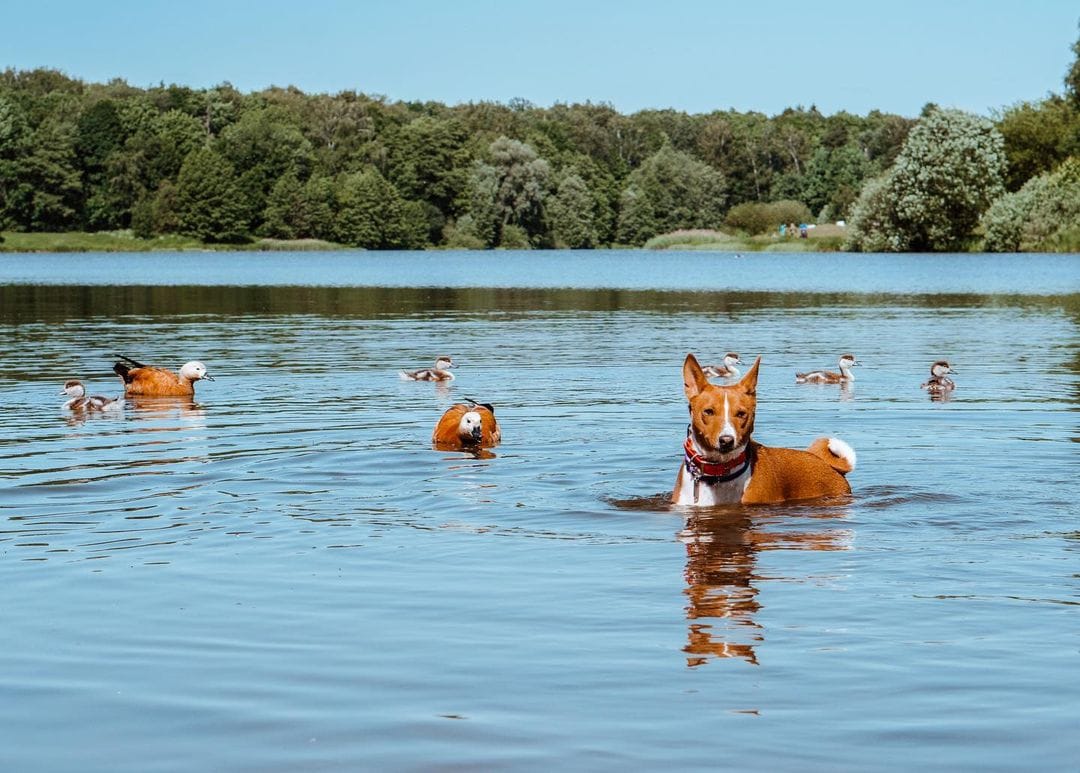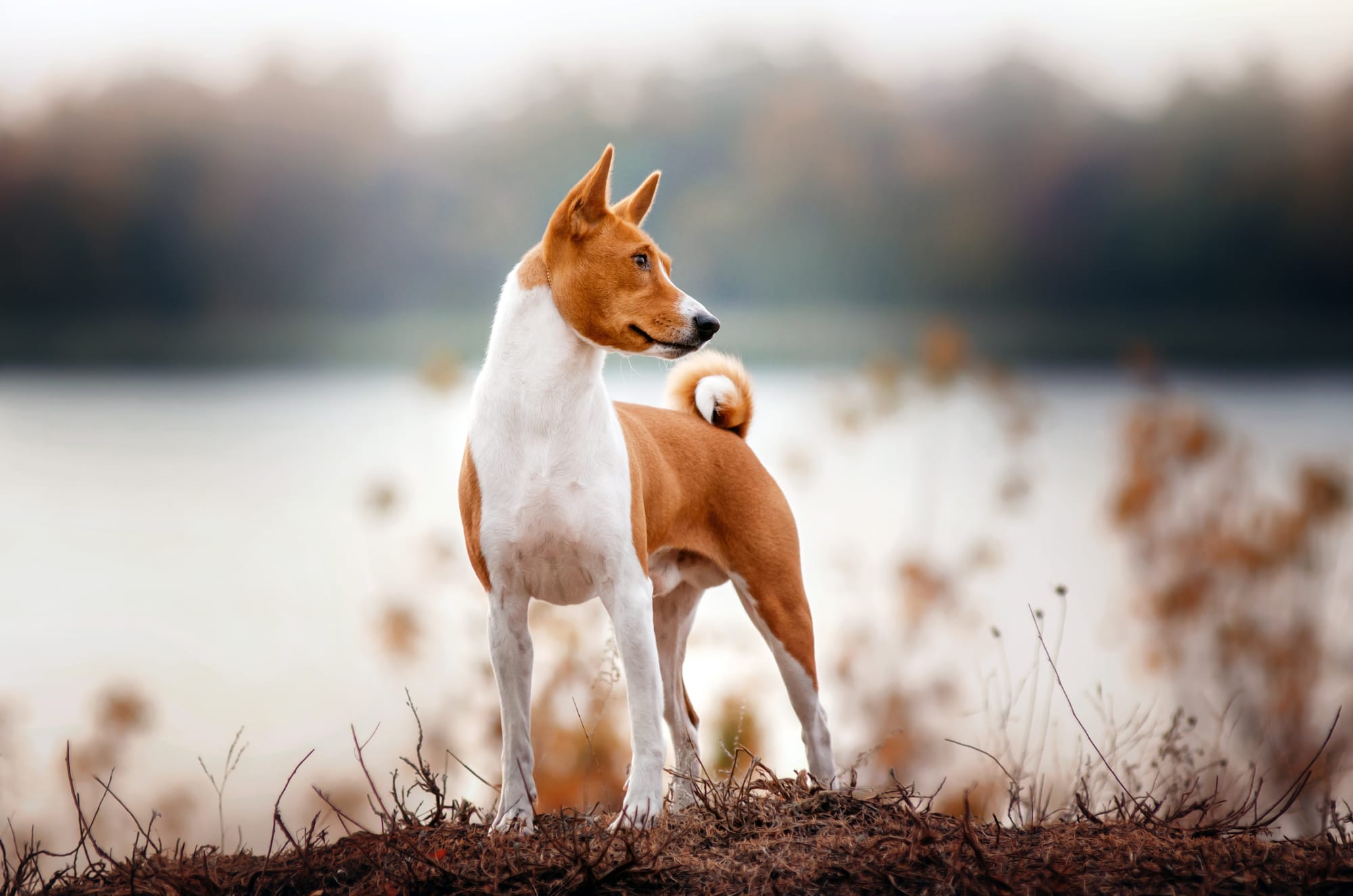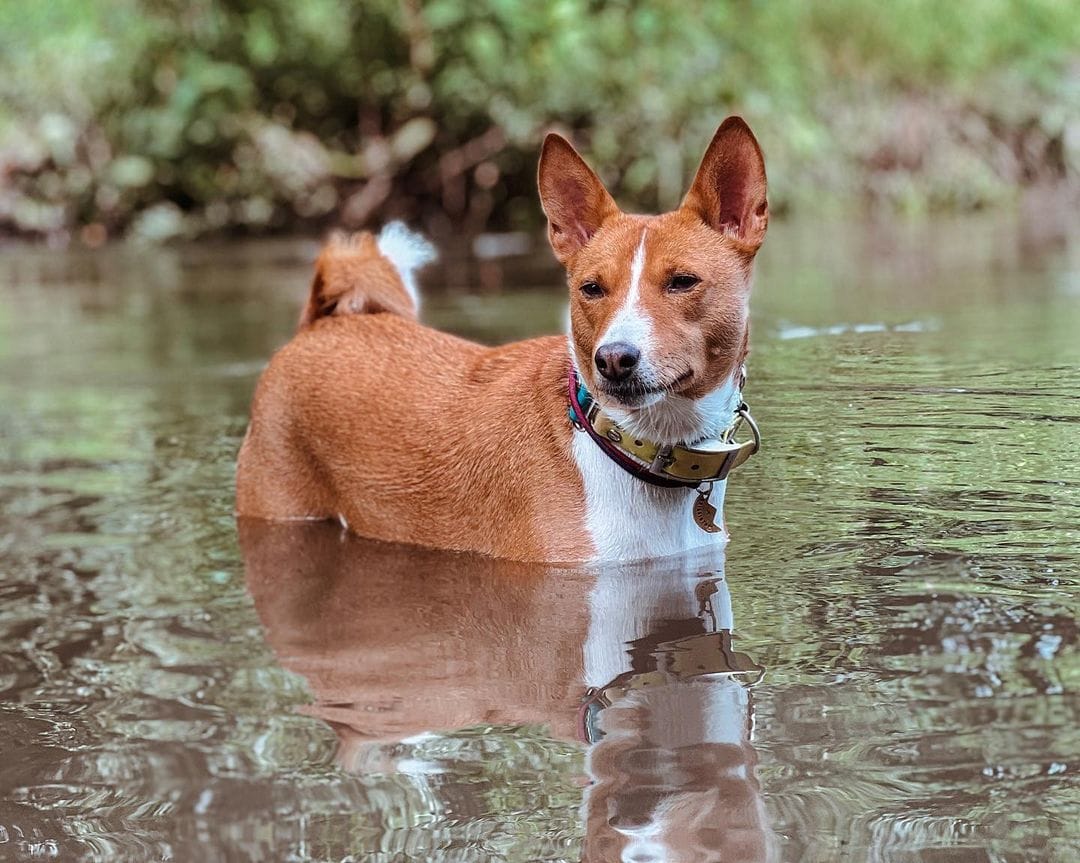Basenjis are a unique breed of dog that originated in Central Africa. They are known for their intelligence, independence, and playful personalities. However, one question that many people have about this breed is whether or not they can swim.

While some dogs seem to take to the water naturally, others are not as comfortable in aquatic environments. When it comes to basenjis, the answer is somewhat mixed. Some Basenjis are natural swimmers and enjoy spending time in the water, while others are less enthusiastic about taking a dip. It ultimately depends on the individual dog and their personality and preferences.
Understanding the Basenji Breed
Origins and History
The Basenji is a breed of dog that originated in Central Africa. This breed is believed to be one of the oldest breeds of domesticated dogs, with evidence of their existence dating back to ancient Egypt. Basenjis were originally bred as hunting dogs, and used to track and hunt small game such as birds and rodents. They were highly valued by hunters due to their intelligence and independence.

Physical Characteristics
Basenjis are a medium-sized breed, typically weighing between 20-25 pounds. They have a short, fine coat that comes in a variety of colors including black, red, and brindle. Their bodies are lean and muscular, with a distinctive curled tail and a wedge-shaped head. Basenjis are known for their barkless nature, instead making a yodel-like sound to communicate.
Temperament and Behavior
Basenjis are intelligent and independent dogs, which can make them challenging to train. They are also known for their strong prey drive, which can make them aggressive towards small animals. However, with proper socialization and training, Basenjis can make excellent companions. They are affectionate and protective of their owners, but can also be aloof with strangers.
Overall, the Basenji is a unique breed with a rich history and distinctive physical and behavioral characteristics. While they may not be the easiest breed to train, their intelligence and companionship make them a popular choice for many dog owners.
Basenji and Water Interaction
Basenjis are a breed of dog that originated from Africa and are known for their hunting abilities. They have a unique set of characteristics that make them stand out from other dog breeds. One of these characteristics is their interaction with water.
Natural Affinity to Water
Basenjis are not known for their love of water, but they do have a natural affinity for it. They are excellent swimmers and can easily navigate through water. This is because they have webbed feet that help them to paddle through water with ease. They also have a short coat that does not weigh them down when they are in the water.
Challenges with Water
While Basenjis may have a natural affinity to water, they also face some challenges when it comes to interacting with it. One of the biggest challenges is their prey drive. Basenjis are hunters at heart, and they may see other animals in the water as prey. This can make them difficult to control when they are in the water.
Another challenge that Basenjis face when it comes to water is their grooming and maintenance. Basenjis have a short coat that is easy to maintain, but when they get wet, their coat can become matted and tangled. This can make it difficult to groom them properly. It is important to dry them off thoroughly after they have been in the water to prevent this from happening.
Hence, while Basenjis may have a natural affinity to water and can be excellent swimmers, they also face some challenges when it comes to interacting with it. It is crucial to be aware of these challenges and to take steps to ensure that your Basenji are safe and comfortable when they are in or around water.
Training Your Basenji to Swim
Basenjis are known for their intelligence, independence, and love for physical activity. While swimming may not come naturally to them, with proper training, they can become excellent swimmers. Here are some tips for training your Basenji to swim.
Starting at an Early Age
It is essential to start training your Basenji to swim at an early age. Puppies are more receptive to new experiences and are less likely to develop a fear of water. Start by introducing your Basenji to shallow water and gradually increase the depth as they become more comfortable. It is important to never force your Basenji into the water and to always supervise them while they are swimming.
Positive Reinforcement Techniques
Positive reinforcement is a key component of training your Basenji to swim. Reward your Basenji with treats and praise when they make progress in their swimming abilities. It is required to be patient and consistent with your training. If your Basenji becomes anxious or scared, take a step back and try again later. With time and attention, your Basenji can become a confident and skilled swimmer.
In summary, while Basenjis may not be natural swimmers, with proper training and patience, they can learn to enjoy the water. Starting at an early age and using positive reinforcement techniques can help your Basenji become a skilled swimmer.
Exercise Needs and Activities

Daily Exercise Requirements
Basenjis are energetic dogs that require daily exercise to maintain their physical and mental health. They have high energy levels and need at least 30-60 minutes of exercise every day. This can include running, walking, or any other activity that gets them moving.
It is important to note that Basenjis have a high prey drive and may chase after small animals. Therefore, they should be kept on a leash or in a fenced yard during exercise to prevent them from running off.
Suitable Activities for Basenjis
Basenjis are a playful breed that enjoys a variety of activities. They are agile and excel in activities such as agility courses and flyball. They also enjoy playing fetch and other interactive games that require attention and focus.
In addition to physical exercise, Basenjis also require mental stimulation. Puzzle toys and training sessions can help keep their minds engaged and prevent boredom.
Hence, Basenjis requires a combination of physical and mental exercise to stay healthy and happy. It is important to provide them with suitable activities that match their energy levels and interests.
Health and Care Considerations
Basenjis are generally healthy dogs, but like all breeds, they are prone to certain health issues. Proper care and attention can help prevent or manage these issues.
Common Health Issues
One of the most common health issues in Basenjis is Fanconi syndrome, a genetic disorder that affects the kidneys. This can lead to dehydration, weight loss, and other complications. Regular check-ups with a veterinarian can help catch this condition early and manage it effectively.
Another health issue that Basenjis may face is hip dysplasia, a condition where the hip joint doesn't develop properly. This can cause pain and mobility issues and may require surgery in severe cases.
Grooming and Coat Maintenance
Basenjis have short, fine coats that don't require much grooming. Weekly brushing with a soft-bristled brush or grooming glove can help remove any loose fur and keep the coat shiny.
Basenjis are also known for being relatively clean dogs and don't require frequent baths. However, it's important to keep their ears clean and dry to prevent infections.
Therefore, Basenjis are a relatively low-maintenance breed when it comes to grooming and health care. Regular check-ups and basic grooming can help keep them healthy and happy for years to come.
Living with a Basenji
Basenjis are highly intelligent and independent dogs that require a special kind of owner. They are not recommended for first-time pet owners or those who are not prepared to devote time and attention to their pets. Here are some things to consider when living with a Basenji.
Home Environment Adaptation
Basenjis are adaptable to different environments, but they thrive in homes where they have plenty of room to run and play. They are active dogs that require daily exercise to keep them healthy and happy. They can adapt to apartment living, but they need to be taken on daily walks or runs to burn off their energy.
Basenjis are also known for their climbing abilities, so it's important to make sure they can't escape from the yard or climb trees. They are independent dogs that can be left alone for short periods, but they need plenty of attention and interaction with their family to prevent boredom and destructive behavior.
Interaction with Family and Other Pets
Basenjis are loyal and affectionate with their families, but they can be wary of strangers. They make excellent watchdogs and will alert their owners to any potential danger. They are also good with children, but they may not tolerate rough play or teasing.
Basenjis can be trained to get along with other pets, but they have a strong prey drive and may not be suitable for homes with small animals such as cats or rodents. They do well with other Basenjis or other dogs of similar size and energy levels.
In summary, living with a Basenji requires a dedicated and attentive owner who can provide them with plenty of exercise, attention, and interaction. They are adaptable to different environments but require a secure yard and supervision to prevent escape. They are loyal and affectionate with their families but may be wary of strangers and may not tolerate rough play with children. They can be trained to get along with other pets, but their strong prey drive may make them unsuitable for homes with small animals.
Choosing a Basenji

Selecting a Reputable Breeder
When looking to buy a Basenji, it is important to select a reputable breeder. This ensures that the puppy you receive is of good quality and has been bred with care. A reputable breeder will have a good understanding of the breed and will be able to answer any questions you may have about the breed's temperament, intelligence, and history.
To find a reputable breeder, it is recommended to do some research online or through local breed clubs. It is important to ask about the breeder's experience, the health of their breeding stock, and the socialization of their puppies. A good breeder will also provide you with health clearances for the puppy's parents and will be willing to answer any questions you may have about the breed.
Considerations Before Buying
Before buying a Basenji, there are some considerations to take into account. Basenjis are a rare breed, which means they can be more expensive than other breeds. It is important to consider the cost of purchasing a Basenji, as well as the cost of their care and maintenance.
Additionally, Basenjis are known for their intelligence and can be challenging to train. It is important to have experience with dog training or to be willing to work with a professional trainer to ensure that your Basenji is well-behaved and obedient.
Overall, when choosing a Basenji, it is important to select a reputable breeder and to consider the cost and training requirements of the breed. With proper care and attention, a Basenji can make a wonderful addition to any family.
Conclusion
In conclusion, the myth that Basenjis cannot swim is debunked, with evidence from both their physical capabilities and real-life success stories. By understanding their unique traits, gradually introducing them to water, and offering positive experiences, Basenjis can become avid swimmers, reaping the numerous physical and mental benefits associated with aquatic activities.

FAQs About Basenjis
Basenjis are unique dogs with a fascinating history. They are known for their barkless yodel, their short, fine coat that sheds minimally, and their small to medium size. Here are some frequently asked questions about Basenjis:
- Can Basenjis swim?
- Basenjis are not natural swimmers, and some may even be afraid of the water. However, with proper training and socialization, many Basenjis can learn to enjoy swimming and even excel at it. It's important to supervise Basenjis around water, as they can tire easily and may not be able to swim for long periods.
- Do Basenjis bark?
- Basenjis are not completely silent, but they are known for their unique yodeling sound instead of a traditional bark. This yodel can be quite loud and piercing, and some Basenjis may also make other vocalizations such as growls or whines.
- Do Basenjis shed?
- Basenjis have a short, fine coat that sheds minimally. However, they do shed seasonally and may require more frequent grooming during these times.
- How big do Basenjis get?
- Basenjis are small to medium-sized dogs, typically weighing between 20 and 25 pounds and standing 16 to 17 inches tall at the shoulder.